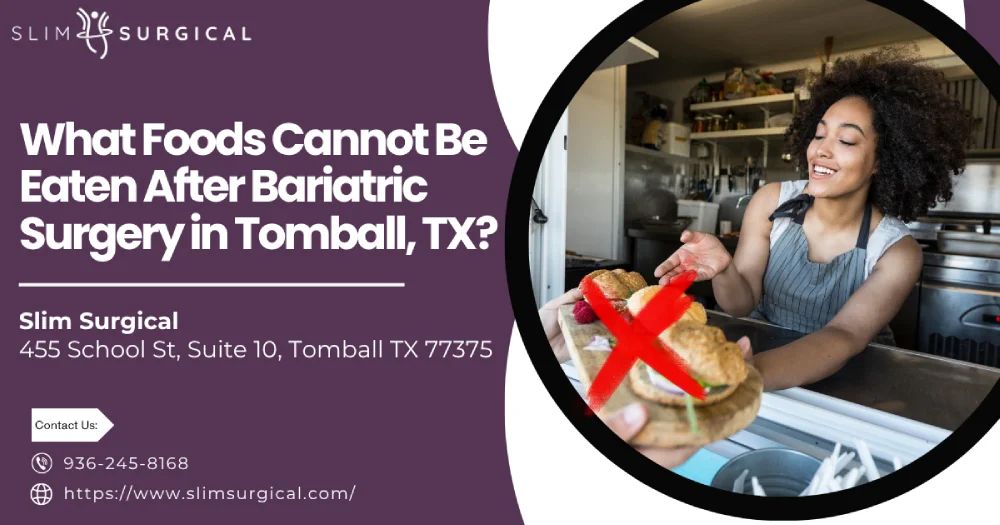
When considering bariatric surgeries such as gastric sleeve or gastric bypass in Tomball, TX, understanding what foods cannot be eaten after bariatric surgery is crucial. Avoiding the wrong foods isn’t just about preventing discomfort—it’s central to sustaining weight loss, minimizing complications, and supporting your recovery journey. Below, we’ll break down which foods to steer clear of and why these choices matter after surgery.
After weight-loss surgery such as gastric sleeve surgery or gastric bypass, your digestive system changes dramatically. With a smaller stomach and altered digestion, foods can cause discomfort or complications. Understanding foods to avoid after bariatric surgery ensures you protect your health and support sustained weight loss.
During your post-surgery transition, following a special diet and keeping in touch with a dietitian or bariatric surgeon helps ensure your nutritional needs are met and you avoid foods that slow your weight loss and improve your post-op experience. Every bariatric surgery patient deserves guidance on foods you should avoid for long-term weight loss success.
Your post-bariatric surgery diet is specifically designed to help you adapt to the effects of a smaller stomach. Bariatric procedures like sleeve gastrectomy or gastric bypass mean solid foods need to be slowly reintroduced, as some foods can be difficult to tolerate and may cause nausea, vomiting, or blockages. Following your diet plan and eating carefully is key to long-term weight loss and avoiding complications.
| Category | Examples | Why to Avoid |
|---|---|---|
| High-Fat Foods | Fried chicken, bacon, sausage, processed foods | Can cause dumping syndrome, nausea, vomiting, impede effective weight loss, and increase risk for high blood pressure |
| High-Sugar Foods | Sodas, candy, pastries, sweetened yogurt | Trigger rapid heart rate, dumping syndrome, blood sugar spikes, and weight regain |
| Tough Meats | Steak, pork chops, jerky | Can be difficult to chew and digest; cause blockage, discomfort, or vomiting |
| Fibrous Produce | Celery, corn, pineapple, asparagus | Tough fibers make these foods hard to tolerate, increasing risk for blockages in the digestive system |
| Carbonated Drinks | Soda, sparkling water, energy drinks | Promote bloating, gas, and may stretch the gastric pouch, impacting gastric sleeve diet |
| Sticky/Chunky Foods | Bread, rice, peanut butter | May form clumps, block gastric outlet, and are foods that may be hard to add back into your diet |
High-fat foods and fried foods can undermine your weight-loss surgery success. After gastric sleeve surgery or other metabolic and bariatric surgery, even small servings of greasy foods—such as fast food or processed foods high in calories—may lead to nausea, vomiting, and poor overall tolerance. Surgery can lead to long-term changes in how you digest and absorb fats.
Even a small amount of sugary foods after gastric sleeve surgery or gastric bypass can trigger dumping syndrome, causing nausea and vomiting, cramps, palpitations, and rapid heartbeat. For those following a gastric sleeve diet, sweets like cake, candy, syrups, and sweetened drinks are among the foods to avoid after gastric procedures to maintain sustained weight loss.
Following gastric sleeve procedure or any types of bariatric surgery, your ability to break down tougher solid foods is often reduced. Tough meats, dry foods, and fibrous vegetables can get stuck, cause nausea and vomiting, and block the delicate passage of your digestive system.
After weight-loss surgery, what you drink is as important as what you eat. Carbonated and sugary drinks expand in your smaller stomach, contribute to bloating and can even stretch your new pouch, undermining effective weight loss and causing nausea.
A post-bariatric surgery diet advances in phases: liquid diet, then pureed foods, soft foods, and finally eating solid foods. Every step of the way, it’s crucial to eat slowly, listen to your body, and avoid foods can cause discomfort as you advance through your special diet.
For successful weight loss after metabolic and bariatric surgery, following surgery with diligent dietary habits is required. Make your bariatric diet easier to follow by:
Metabolic and bariatric surgery in Tomball, TX can help you achieve significant weight loss and improved health. Choosing the right foods to avoid after gastric sleeve surgery, gastric bypass, or other bariatric procedures is central to your long-term weight loss. By understanding foods you should avoid—including high-fat foods, sugary foods, fibrous foods, greasy foods, and tough/chewy solid foods—you set yourself up for effective weight loss and long-term weight management.
Remember to personalize your post-surgery diet with guidance from a dietitian or bariatric surgeon, be mindful of uncomfortable symptoms like nausea and vomiting, and follow every step of the way for the sustained results you deserve.
Yes. After bariatric surgery, foods like fried items, tough meats, fibrous vegetables, and carbonated drinks often remain problematic—even after recovery. While some may be tolerated in small amounts later on, they can cause nausea, bloating, or weight regain. Always test new foods slowly and consult your Tomball care team.
Dry foods—like crackers, dry bread, and dense proteins without sauces—can be tough to swallow and may get stuck in your smaller stomach pouch, leading to discomfort or even blockages. Soften foods with broth or sauces, and always eat slowly to minimize issues after weight loss surgery.
Processed foods typically contain high levels of fat, salt, and sugar and provide little nutrition. After weight-loss surgery, eating nutrient-rich, whole foods is preferable to support healing, effective weight loss, and long-term health. Limit processed and packaged snacks to maintain a balanced bariatric diet.
Most bariatric surgery patients begin eating soft and pureed foods before transitioning to solid foods, generally 4-6 weeks after surgery. Your bariatric surgeon or dietitian will provide a specific timeline to personalize your diet advancement and ensure proper healing for sustained weight loss.
Drinking fluids with meals can overfill your smaller stomach pouch or flush food through too quickly, risking nausea and vomiting. Separating liquids and solids—by about 30 minutes—helps you feel fuller on less food and aids digestion after gastric sleeve or gastric bypass surgery.
Some foods—like fried foods, sticky bread, and carbonated drinks—may need to be minimized or avoided long-term after gastric bypass or sleeve surgery to prevent discomfort and maintain weight loss. Your dietitian will help determine which foods are safest to reintroduce once you’ve healed.
After bariatric surgeries, your smaller gastric pouch reduces the capacity for large meals and requires that you chew thoroughly and eat slowly. This shift in eating habits helps you avoid nausea, support effective weight loss, and encourages mindful, balanced choices as part of your post-surgery diet.
Sugar-free foods help prevent dumping syndrome, blood sugar spikes, and weight regain after weight loss surgery. Foods high in sugar can disrupt your metabolic balance and cause physical discomfort. Focus on natural, low-sugar selections to help reach your long-term weight loss success.
Raw vegetables can be difficult to digest and may cause blockages or discomfort after bariatric procedures. It’s best to introduce cooked or pureed vegetables first, then slowly add small amounts of raw produce under your dietitian’s guidance as your digestive system adapts.
Protein is essential for healing, preserving muscle mass during weight loss, and supporting a healthy metabolism after bariatric surgery. Focus on lean protein sources like fish, chicken, tofu, and eggs, and personalize your intake according to your specific diet plan for optimal recovery.

Start your journey toward health and confidence with Slim Surgical. Our expert surgeon is here to guide you every step of the way with advanced care tailored to your goals.

2025 Slim Surgical. All right reserved. Website Design & SEO By: Authority Solutions®